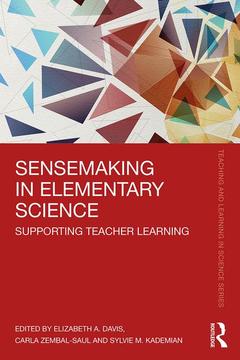Sensemaking in Elementary Science Supporting Teacher Learning Teaching and Learning in Science Series
Coordonnateurs : Davis Elizabeth A., Zembal-Saul Carla, Kademian Sylvie M.

Grounded in empirical research, this book offers concrete pathways to direct attention towards elementary science teaching that privileges sensemaking, rather than isolated activities and vocabulary. Outlining a clear vision for this shift using research-backed tools, pedagogies, and practices to support teacher learning and development, this edited volume reveals how teachers can best engage in teaching that supports meaningful learning and understanding in elementary science classrooms.
Divided into three sections, this book demonstrates the skills, knowledge bases, and research-driven practices necessary to make a fundamental shift towards a focus on students? ideas and reasoning, and covers topics such as:
- An introduction to sensemaking in elementary science;
- Positioning students at the center of sensemaking;
- Planning and enacting investigation-based science discussions;
- Designing a practice-based elementary teacher education program;
- Reflections on science teacher education and professional development for reform-based elementary science.
In line with current reform efforts, including the Next Generation Science Standards (NGSS), Sensemaking in Elementary Science is the perfect resource for graduate students and researchers in science education, elementary education, teacher education, and STEM education looking to explore effective practice, approaches, and development within the elementary science classroom.
Chapter 2: Focusing on kindergarten girls as science learners: Teacher positioning of students supports science engagement and sensemaking in the classroom, Alicia McDyre
Chapter 3: Portrait of a first grade teacher: Using science practices to leverage young children’s sensemaking in science, Amber S. Bismack, University of Michigan & Leigh Ann Haefner
Chapter 4: What’s Your Evidence? Revisited: Organizing Data Collection and Analysis to Support Students’ Sensemaking, Carla Zembal-Saul, Penn State University & Kimber Hershberger
Chapter 5: Literacy Practices for Sensemaking in Science that Promote Epistemic Alignment, LeeAnna Hooper & Carla Zembal-Saul
Chapter 6: Science, engineering, literacy practices and place-based education: Powerful practices for integration, Jennifer Cody, Mandy Biggers
Response: Considering Issues of Equity and Identity in Elementary Science, Lucy Avraamidou, University of Groningen, The Netherlands
Response: Considering Issues of Science Practice in Elementary Science, Katherine McNeill, Boston College
Elizabeth A. Davis is Professor of Science Education at University of Michigan, USA.
Carla Zembal-Saul is the Kahn Professor of STEM Education at The Pennsylvania State University, USA.
Sylvie M. Kademian is Lecturer of Science Education at University of Michigan, USA.
Date de parution : 10-2019
15.2x22.9 cm
Date de parution : 10-2019
15.2x22.9 cm
Thème de Sensemaking in Elementary Science :
Mots-clés :
High Leverage Teaching Practices; Integrate Science Practices; STEM education; Ambitious Science Teaching; sensemaking; Novice Elementary Teachers; elementary science teachers; NGSS Performance Expectation; professional development; NGSS Lead States; science teacher learning; Field Placement Classroom; Elizabeth A; Davis; National Academies; Carla Zembal-Saul; Elementary Science Teacher Education; Sylvie Kademian; Pennsylvania State University; Practice Based Teacher Education; science practices; Elementary Science Methods; science teaching; PDS Context; scaffolding; High Leverage Practices; place-based education; PDS Work; elementary science teaching; Elementary Science Teacher; teacher learning pedagogies; next generation science standards; Content Storyline; reform-based elementary science; Disciplinary Core Ideas; Core Science Ideas; PSTs; Lesson Planning Tool; School District University Partnership; PDS Partnership



